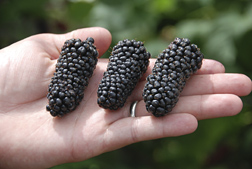THIRD ANNOUNCEMENT
Intermountain
Native Plant Summit
VIII
(aka ‘Back 2 Boise’)
sponsored by the Boise State University Dept. of Biological Sciences
and the USDA-Agricultural Research Service, Logan, UT
OPEN TO THE PUBLIC AND FREE OF CHARGE
(SO PLEASE CONSIDER JOINING US)
general sessions
Tuesday & Wednesday, November 1-2, 2016
plant material workshops
Wednesday & Thursday, November 2-3, 2016
Boise State University Student Union
Boise, Idaho
There is no registration fee,but advance pre-registration is preferred.Please e-mail Cody at dakota.ray@ars.usda.gov by Friday, October 21, 2016 to pre-register
Friday, October 14, 2016
Sunday, October 2, 2016
2016 Western Ag Industry Survey Report Available
2016 Western Ag Industry
Survey
In early 2016, the idea for the Agricultural Industry Survey
originated from a similar effort administered by a group of Colorado Extension
Specialists. Members of the Western Extension Committees (WEC) on Farm
Management and Marketing, made up of Extension economists from 13 Western
States, Guam, and the U.S. Pacific Islands then initiated a survey specific to
agriculture in the west.
The survey invitation was emailed to the WEC membership who
distributed it through Extension contact channels.
The survey report
is now available…
is now available…
Labels:
agriculture,
business,
farm management
Take the Ag Legacy Survey
University of Wyoming Extension Offers Legacy Course
Ag Legacy Survey
Survey John Hewlett hewlett@uwyo.edu
What is an Ag Legacy?
A legacy is the summation of a lifetime of achievement and the context in which that lifetime will be remembered. A legacy is not just money but a reputation, what was accomplished, and the difference a person makes in the world as they pass through; their mark on the universe.
More importantly, a legacy is something that is passed along years after a person leaves the world as we know it. In historical terms, a legacy is something that is handed down from one generation to the next. Deciding to leave a legacy can provide a road map for the future; embracing the meaning of a life. …to read more click here
We would like to hear from you!
Take just a few moments to share with us your perspective on transitioning management responsibilities to the next generation. Your answers to the Management Showdown questions help us to better understand the issues in transitioning management responsibilities between generations. Click the image at the left to load the Ag Legacy Survey and give us your perspective. . .
Labels:
farm management,
succession
DISC MOWERS DAMAGE GRASS IN GRASS-ALFALFA MIXES
.
by Bruce Anderson,
Extension Forage Specialist
University of Nebraska-Lincoln
Disc mowers are fantastic machines. Compared to sickle bar mowers, they
cut faster, have less maintenance and repairs, and rarely plug. They can
cut the crop shorter and keep going even if they occasionally scalp the
surface. And that’s the problem!
`With alfalfa, regrowth comes from crown buds using nutrients stored
underground in the taproot. It doesn’t matter if you leave a 1-inch or a
4-inch stubble, alfalfa regrowth rate will be the same.
Labels:
damage,
disc mower,
grass,
swather
Saturday, October 1, 2016
ARS Releases New Berry Varieties
Two New Berries for You from ARS
 By Sharon Durham
By Sharon DurhamSeptember 28, 2016
Agricultural Research Service (ARS) geneticist Chad Finn and his colleagues at the Horticultural Crops Research Unit in Corvallis, Oregon, developed two new berry varieties—a blueberry and a blackberry—and recently released them to the public.
Baby Blues, a blueberry cultivar, is a vigorous, high-yielding, small-fruited, machine-harvestable highbush blueberry with outstanding fruit quality. It is well suited for processing markets that require a small fruit size. Baby Blues should offer growers and processors an alternative to the low-yielding Rubel highbush blueberry, and it should thrive in milder areas where northern highbush blueberries are grown, according to Finn.
Labels:
ARS,
blackberries,
blueberries,
research,
varieties
Subscribe to:
Comments (Atom)
